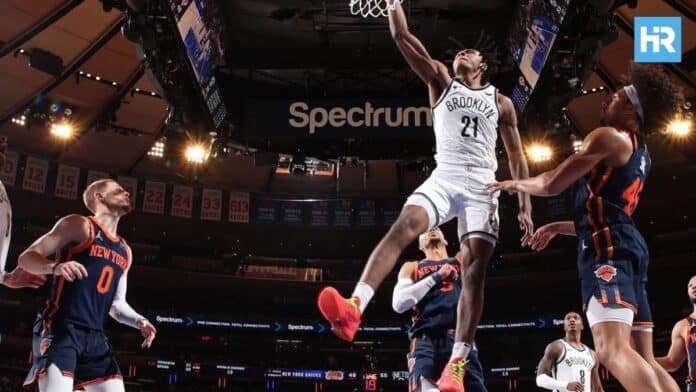The NBA Finals have given us countless memorable moments, showcasing the dominance of legendary franchises and emerging powerhouses.This guide provides a complete list of NBA Finals winners highlights teams and players with the most championships.
- The Boston Celtics and Los Angeles Lakers are tied for the most NBA championships with 17 titles each.
- Bill Russell holds the record for the most NBA championships won by a player, with 11 titles.
- The 2024 NBA Finals will feature the Boston Celtics and Dallas Mavericks, with the Celtics favored to win.
Most Iconic Moments of the NBA Finals Winners
The NBA Finals showcase skill, strategy, and sheer willpower, where the best teams from the Eastern and Western Conferences battle for the championship.Let’s have a look at some of the most memorable moments from the history of the NBA.
2023: Denver Nuggets Defeated Miami Heat (4-1)
The Denver Nuggets defeated the Miami Heat in a thrilling series to capture their first NBA championship in franchise history. Nikola Jokić was instrumental, earning the Finals MVP with averages of 30.2 points, 14.0 rebounds, and 7.2 assists. Denver’s balanced attack and Jokić’s dominance were too much for Miami, which struggled with shooting and consistency throughout the series.
2022: Golden State Warriors Defeated Boston Celtics (4-2)
The Golden State Warriors returned to the pinnacle of the NBA by overcoming the Boston Celtics in six games. Stephen Curry, who is one of the highest-paid NBA player, was named Finals MVP for the first time in his career, showcasing his elite shooting and leadership. The Warriors’ experience and depth proved decisive against a resilient Celtics squad.
2021: Milwaukee Bucks Defeated Phoenix Suns (4-2)
The Milwaukee Bucks, led by Giannis Antetokounmpo, won their first championship in 50 years. Giannis delivered a historic performance in Game 6, scoring 50 points to secure the title. His dominance in the paint and leadership were crucial in overcoming the Suns, who were led by Chris Paul and Devin Booker.
2020: Los Angeles Lakers Defeated Miami Heat (4-2)
The Los Angeles Lakers, driven by LeBron James and Anthony Davis, won the championship in the NBA bubble in Orlando. LeBron was named Finals MVP, adding to his legacy with his fourth title. The Lakers’ defense and the star power of James and Davis were key in defeating the Heat, who made an impressive run as the fifth seed.
2019: Toronto Raptors Defeated Golden State Warriors (4-2)
The Toronto Raptors secured their first NBA title by overcoming the injury-hit Golden State Warriors. Kawhi Leonard was the Finals MVP, showcasing his two-way excellence. The Raptors capitalized on injuries to Warriors’ stars Kevin Durant and Klay Thompson, but their balanced play and Leonard’s leadership were pivotal in their historic win.
2018: Golden State Warriors Defeated Cleveland Cavaliers (4-0)
The Golden State Warriors swept the Cleveland Cavaliers to win their third title in four years. Kevin Durant earned Finals MVP honors, displaying his scoring prowess and defensive contributions. The Warriors’ “superteam,” including Stephen Curry, Klay Thompson, and Draymond Green, was too powerful for LeBron James and the Cavaliers.
2017: Golden State Warriors Defeated Cleveland Cavaliers (4-1)
In a rematch of the previous two Finals, the Warriors added Kevin Durant to their roster, making them nearly unbeatable. Durant was named Finals MVP as Golden State defeated Cleveland in five games. The Warriors’ blend of shooting, defense, and Durant’s scoring was overwhelming for the Cavaliers.
2016: Cleveland Cavaliers Defeated Golden State Warriors (4-3)
The Cleveland Cavaliers made history by becoming the first team to overcome a 3-1 deficit in the NBA Finals. LeBron James and Kyrie Irving were spectacular, with James earning Finals MVP. The series featured LeBron’s iconic block in Game 7 and Irving’s clutch three-pointer, solidifying their comeback against the 73-win Warriors.
2015: Golden State Warriors Defeated Cleveland Cavaliers (4-2)
Under coach Steve Kerr, the Golden State Warriors won their first championship in 40 years. Stephen Curry and Klay Thompson led the charge, with Andre Iguodala earning Finals MVP for his defense on LeBron James and timely scoring. The Warriors’ “small ball” lineup and three-point shooting revolutionized the game.
2014: San Antonio Spurs Defeated Miami Heat (4-1)
The San Antonio Spurs executed a basketball clinic, defeating the Miami Heat in five games. Kawhi Leonard was named Finals MVP for his stellar defense and scoring. The Spurs’ ball movement, teamwork, and depth overwhelmed the Heat, who sought a three-peat.
2013: Miami Heat Defeated San Antonio Spurs (4-3)
The 2013 NBA Finals was a dramatic showdown between the Miami Heat and the San Antonio Spurs. The series went to a thrilling Game 7, where LeBron James led the Heat to a 95-88 victory with 37 points and 12 rebounds, securing his second consecutive Finals MVP. The series is also remembered for Ray Allen’s clutch three-pointer in Game 6, which forced overtime and kept Miami’s championship hopes alive.
2012: Miami Heat Defeated Oklahoma City Thunder (4-1)
The Miami Heat, featuring the “Big Three” of LeBron James, Dwyane Wade, and Chris Bosh, defeated the Oklahoma City Thunder to claim their second NBA title in franchise history. LeBron James, who earned his first Finals MVP, dominated the series with averages of 28.6 points, 10.2 rebounds, and 7.4 assists per game, highlighting his all-around prowess and leading Miami to a decisive 4-1 series victory.
2011: Dallas Mavericks Defeated Miami Heat (4-2)
The Dallas Mavericks, led by Finals MVP Dirk Nowitzki, achieved their first NBA championship by defeating the heavily favored Miami Heat. Nowitzki’s clutch performances and the Mavericks’ resilient team play were key in overcoming the Heat, who had recently formed their star trio of LeBron James, Dwyane Wade, and Chris Bosh. This victory was a testament to Dallas’ perseverance and strategic excellence.
2010: Los Angeles Lakers Defeated Boston Celtics (4-3)
The Los Angeles Lakers, led by Finals MVP Kobe Bryant, won their 16th NBA title by defeating the Boston Celtics in a hard-fought seven-game series. Bryant, who averaged 28.6 points per game, showcased his scoring and leadership abilities. The series highlighted the fierce rivalry between the two storied franchises, with the Lakers emerging victorious in a dramatic Game 7.
2009: Los Angeles Lakers Defeated Orlando Magic (4-1)
The Los Angeles Lakers secured back-to-back championships by defeating the Orlando Magic. Kobe Bryant, named Finals MVP, delivered stellar performances throughout the series, averaging 32.4 points, 5.6 rebounds, and 7.4 assists per game. The Lakers’ experience and Bryant’s dominance were pivotal in overcoming the Magic’s young and talented roster.
2008: Boston Celtics Defeated Los Angeles Lakers (4-2)
The Boston Celtics, featuring their “Big Three” of Paul Pierce, Kevin Garnett, and Ray Allen, won their first championship since 1986 by defeating the Los Angeles Lakers. Paul Pierce was named Finals MVP for his outstanding play. The Celtics’ defense and team chemistry proved too strong for the Lakers, culminating in a decisive Game 6 victory.
2007: San Antonio Spurs Defeated Cleveland Cavaliers (4-0)
The San Antonio Spurs swept the Cleveland Cavaliers to win their fourth NBA championship. Finals MVP Tony Parker led the Spurs with scoring and playmaking, averaging 24.5 points per game in the series. The Spurs’ balanced attack and defensive prowess stifled the Cavaliers, who were making their first Finals appearance behind young star LeBron James.
2006: Miami Heat Defeated Dallas Mavericks (4-2)
The Miami Heat, led by Finals MVP Dwyane Wade, won their first NBA championship by overcoming the Dallas Mavericks. Wade delivered a series of remarkable performances, averaging 34.7 points per game and dominating in clutch moments. His leadership and scoring were instrumental in the Heat’s comeback from a 0-2 series deficit to claim the title.
2005: San Antonio Spurs Defeated Detroit Pistons (4-3)
The San Antonio Spurs won their third championship by defeating the defending champion Detroit Pistons in a tightly contested seven-game series. Tim Duncan was named Finals MVP, contributing with his scoring, rebounding, and defense. The Spurs’ teamwork and depth were key in overcoming the Pistons’ physical and disciplined play.
2004: Detroit Pistons Defeated Los Angeles Lakers (4-1)
The Detroit Pistons won a stunning upset by defeating the star-studded Los Angeles Lakers to win their first title since 1990. Finals MVP Chauncey Billups led a balanced Pistons team that excelled in defense and teamwork. Detroit’s strategy and execution overwhelmed the Lakers, who featured Shaquille O’Neal, Kobe Bryant, Karl Malone, and Gary Payton.
2003: San Antonio Spurs Defeated New Jersey Nets (4-2)
The San Antonio Spurs clinched their second NBA title by overcoming the New Jersey Nets in six games. Tim Duncan was the standout performer, earning Finals MVP honors with averages of 24.2 points, 17 rebounds, and 5.3 assists per game. Duncan’s dominance in the paint and all-around play were pivotal in the Spurs’ victory. The series also marked the farewell of David Robinson, who retired as a champion.
2002: Los Angeles Lakers Defeated New Jersey Nets (4-0)
The Los Angeles Lakers completed a three-peat by sweeping the New Jersey Nets in the Finals. Shaquille O’Neal was named Finals MVP for the third consecutive year, showcasing his power and skill with averages of 36.3 points, 12.3 rebounds, and 3.8 assists per game. Kobe Bryant’s dynamic play contributed significantly as the Lakers demonstrated dominance in the early 2000s.
2001: Los Angeles Lakers Defeated Philadelphia 76ers (4-1)
The Los Angeles Lakers, led by Shaquille O’Neal and Kobe Bryant, won their second straight title by defeating the Philadelphia 76ers. Shaq’s overwhelming presence earned him Finals MVP honors again, with averages of 33 points, 15.8 rebounds, and 4.8 assists. Allen Iverson’s heroic performance in Game 1, where he scored 48 points and led the 76ers to their only win, remains a series highlight.
2000: Los Angeles Lakers Defeated Indiana Pacers (4-2)
The Los Angeles Lakers captured their first championship since 1988 by defeating the Indiana Pacers. Shaquille O’Neal was the Finals MVP, averaging 38 points and 16.7 rebounds per game. This victory marked the beginning of the Lakers’ early 2000s dynasty under coach Phil Jackson and the dominant duo of Shaq and Kobe Bryant.
1999: San Antonio Spurs Defeated New York Knicks (4-1)
In a lockout-shortened season, the San Antonio Spurs won their first NBA championship by defeating the New York Knicks. Tim Duncan was named Finals MVP, leading the Spurs with his exceptional play on both ends of the floor. The Knicks, an eighth seed, made an improbable run to the Finals but were ultimately overmatched by the Spurs’ frontcourt duo of Duncan and David Robinson.
1998: Chicago Bulls Defeated Utah Jazz (4-2)
The Chicago Bulls defeated the Utah Jazz to secure their sixth championship in eight years. Michael Jordan was once again the Finals MVP, highlighted by his iconic game-winning shot in Game 6, often referred to as “The Last Shot.” Jordan’s performance, averaging 33.5 points per game, cemented his legacy as one of the greatest players in NBA history.
1997: Chicago Bulls Defeated Utah Jazz (4-2)
The Chicago Bulls, led by Michael Jordan and Scottie Pippen, won their fifth title by defeating the Utah Jazz. Jordan was named Finals MVP, with a memorable “Flu Game” performance in Game 5, where he scored 38 points despite being visibly ill. The Bulls’ resilience and Jordan’s heroics were key in overcoming the Jazz’s challenge.
1996: Chicago Bulls Defeated Seattle SuperSonics (4-2)
Under coach Phil Jackson, the Chicago Bulls set an NBA record with 72 regular-season wins and capped off the season by defeating the Seattle SuperSonics in the Finals. Michael Jordan, who had returned to the NBA after a brief retirement, earned Finals MVP honors. The Bulls’ dominant season and Jordan’s return to the pinnacle of the sport were defining moments of the 1996 Finals.
1995: Houston Rockets Defeated Orlando Magic (4-0)
The Houston Rockets, led by Hakeem Olajuwon, won their second consecutive NBA championship by sweeping the Orlando Magic. Olajuwon was named Finals MVP, showcasing his versatility and dominance in the post. The Rockets’ experience and composure outmatched the young Magic team, featuring Shaquille O’Neal and Penny Hardaway.
1994: Houston Rockets Defeated New York Knicks (4-3)
The Houston Rockets won their first NBA title by defeating the New York Knicks in a thrilling seven-game series. Hakeem Olajuwon was named Finals MVP, leading the Rockets with his exceptional play. The series is remembered for its intense defense and close games, with Olajuwon’s clutch performances and key blocks sealing the Rockets’ victory.
1994: Houston Rockets Defeated New York Knicks (4-3)
The 1994 NBA Finals featured a fierce battle between the Houston Rockets and the New York Knicks, going to a dramatic Game 7. Hakeem Olajuwon was named Finals MVP, leading the Rockets with 26.9 points, 9.1 rebounds, and 3.6 blocks per game. His defensive prowess, particularly a crucial block on John Starks in Game 6, helped secure Houston’s first NBA title. The series is also remembered for its intense physical play and the iconic matchup between Olajuwon and Patrick Ewing.
1993: Chicago Bulls Defeated Phoenix Suns (4-2)
The Chicago Bulls clinched their third consecutive championship by defeating the Phoenix Suns. Michael Jordan was once again the Finals MVP, averaging 41.0 points per game, a Finals record. His scoring outbursts and clutch performances, including a 55-point game in Game 4, were pivotal in overcoming Charles Barkley and the Suns. This victory solidified the Bulls’ first three-peat under coach Phil Jackson.
1992: Chicago Bulls Defeated Portland Trail Blazers (4-2)
The Chicago Bulls, led by Michael Jordan, secured their second straight title by defeating the Portland Trail Blazers. Jordan was named Finals MVP, highlighted by his remarkable “shrug game” in Game 1, where he made six three-pointers in the first half. The Bulls’ combination of Jordan’s scoring and Scottie Pippen’s all-around play was too much for the Blazers to handle.
1991: Chicago Bulls Defeated Los Angeles Lakers (4-1)
Michael Jordan won his first NBA championship, leading the Chicago Bulls past the Los Angeles Lakers. Jordan, named Finals MVP, averaged 31.2 points, 11.4 assists, and 6.6 rebounds per game. His spectacular play, including the iconic switch-handed layup in Game 2, marked the beginning of the Bulls’ dynasty. This series also saw the end of Magic Johnson’s Finals appearances, adding to the historical significance.
1990: Detroit Pistons Defeated Portland Trail Blazers (4-1)
The Detroit Pistons won their second consecutive NBA championship by defeating the Portland Trail Blazers. Finals MVP Isiah Thomas led the Pistons with his scoring and leadership. Detroit’s “Bad Boys” defense, combined with Thomas’ clutch performances, especially his 43-point outburst in Game 4, was crucial in overpowering the Blazers.
1989: Detroit Pistons Defeated Los Angeles Lakers (4-0)
The Detroit Pistons swept the Los Angeles Lakers to win their first NBA title. Joe Dumars was named Finals MVP, showcasing his scoring and defensive abilities. The Pistons’ relentless defense and balanced offense, known as the “Bad Boys,” ended the Lakers’ hopes of a three-peat and established Detroit as a formidable force in the league.
1988: Los Angeles Lakers Defeated Detroit Pistons (4-3)
The Los Angeles Lakers claimed back-to-back championships by defeating the Detroit Pistons in a thrilling seven-game series. Finals MVP James Worthy delivered a standout performance in Game 7, recording a triple-double with 36 points, 16 rebounds, and 10 assists. The Lakers’ experience and clutch play, led by Magic Johnson and Kareem Abdul-Jabbar, were key in overcoming the Pistons’ physical play.
1987: Los Angeles Lakers Defeated Boston Celtics (4-2)
The Los Angeles Lakers, led by Magic Johnson, defeated the Boston Celtics to win their fourth championship of the 1980s. Johnson, named Finals MVP, averaged 26.2 points, 13.0 assists, and 8.0 rebounds per game. His iconic junior sky hook in Game 4 and overall leadership were pivotal in the Lakers’ victory over their arch-rivals.
1986: Boston Celtics Defeated Houston Rockets (4-2)
The Boston Celtics, featuring Larry Bird, won their 16th championship by defeating the Houston Rockets. Bird was named Finals MVP, averaging 24 points, 9.7 rebounds, and 9.5 assists per game. The Celtics’ depth and Bird’s all-around brilliance overwhelmed the Rockets, who were led by the young twin towers, Hakeem Olajuwon and Ralph Sampson.
1985: Los Angeles Lakers Defeated Boston Celtics (4-2)
The Los Angeles Lakers avenged their previous Finals losses to the Boston Celtics by winning the 1985 championship. Kareem Abdul-Jabbar was named Finals MVP, averaging 25.7 points and 9 rebounds per game. His leadership and the Lakers’ fast-paced offense under coach Pat Riley were decisive in securing the title.
1984: Boston Celtics Defeated Los Angeles Lakers (4-3)
The 1984 NBA Finals is often hailed as a classic confrontation between two storied franchises, the Boston Celtics and the Los Angeles Lakers. The series went to a thrilling Game 7, where the Celtics emerged victorious. Larry Bird was named Finals MVP, averaging 27.4 points and 14 rebounds per game. This victory marked the Celtics’ 15th championship and intensified the rivalry with the Lakers, led by Magic Johnson and Kareem Abdul-Jabbar.
1983: Philadelphia 76ers Defeated Los Angeles Lakers (4-0)
The Philadelphia 76ers, led by Moses Malone and Julius Erving, swept the Los Angeles Lakers to capture their third NBA title. Moses Malone’s dominant performances, where he averaged 25.8 points and 18 rebounds per game, earned him the Finals MVP. The 76ers’ “Fo’, Fo,’ Fo'” playoff run, predicted by Malone, highlighted their dominance throughout the postseason.
1982: Los Angeles Lakers Defeated Philadelphia 76ers (4-2)
The Los Angeles Lakers, featuring Magic Johnson and Kareem Abdul-Jabbar, won their second title in three years by defeating the Philadelphia 76ers. Magic Johnson was named Finals MVP, averaging 16.2 points, 10.8 rebounds, and 8 assists per game. The Lakers’ fast-paced style and Magic’s versatility were key factors in their success .
1981: Boston Celtics Defeated Houston Rockets (4-2)
The Boston Celtics, led by Larry Bird, captured their 14th championship by defeating the Houston Rockets. Cedric Maxwell was named Finals MVP for his consistent scoring and defensive efforts. Bird’s all-around game and the Celtics’ depth were crucial in overcoming the Rockets’ challenge.
1980: Los Angeles Lakers Defeated Philadelphia 76ers (4-2)
The 1980 NBA Finals featured a breakout performance by rookie Magic Johnson, who filled in at center for an injured Kareem Abdul-Jabbar in Game 6. Magic scored 42 points, grabbed 15 rebounds, and dished out 7 assists, leading the Lakers to victory and earning Finals MVP honors. This series marked the beginning of the Lakers’ Showtime era.
1979: Seattle SuperSonics Defeated Washington Bullets (4-1)
The Seattle SuperSonics won their first NBA championship by defeating the Washington Bullets in a rematch of the previous year’s Finals. Dennis Johnson was named Finals MVP for his stellar defense and clutch scoring. The SuperSonics’ balanced attack and strong defense were key to their success.
1978: Washington Bullets Defeated Seattle SuperSonics (4-3)
The Washington Bullets, led by Wes Unseld and Elvin Hayes, captured their first NBA championship in a hard-fought seven-game series against the Seattle SuperSonics. Wes Unseld was named Finals MVP, showcasing his leadership and rebounding prowess. This victory remains the franchise’s only NBA title.
1977: Portland Trail Blazers Defeated Philadelphia 76ers (4-2)
The Portland Trail Blazers, led by Finals MVP Bill Walton, won their first and only NBA championship by defeating the Philadelphia 76ers. Walton’s all-around play, including his passing, rebounding, and defense, was instrumental in Portland’s comeback after losing the first two games of the series.
1976: Boston Celtics Defeated Phoenix Suns (4-2)
The 1976 NBA Finals featured one of the most dramatic games in NBA history, Game 5, which included three overtimes. The Boston Celtics, led by Finals MVP Jo Jo White, eventually defeated the Phoenix Suns in six games. The Celtics’ experience and clutch performances were crucial in securing their 13th championship.
1975: Golden State Warriors Defeated Washington Bullets (4-0)
The Golden State Warriors, led by Finals MVP Rick Barry, swept the Washington Bullets to win their first NBA title since moving to California. Barry’s scoring and leadership were key factors in the Warriors’ dominant performance throughout the series.
1974: Boston Celtics Defeated Milwaukee Bucks (4-3)
The Boston Celtics, featuring Finals MVP John Havlicek, won their 12th championship by defeating the Milwaukee Bucks in a seven-game series. Havlicek’s scoring, clutch play, and strong performances from Dave Cowens and Jo Jo White were vital in the Celtics’ victory.
1973: New York Knicks Defeated Los Angeles Lakers (4-1)
The New York Knicks won their second championship by defeating the Los Angeles Lakers. Willis Reed was named Finals MVP, providing leadership and key contributions despite dealing with injuries. The Knicks’ team-oriented play and strong defense were instrumental in their triumph.
1972: Los Angeles Lakers Defeated New York Knicks (4-1)
The Los Angeles Lakers, led by Finals MVP Wilt Chamberlain, captured their first NBA title since moving to Los Angeles. Chamberlain’s dominant inside presence and the Lakers’ record-setting 33-game winning streak during the regular season highlighted their championship run.
1971: Milwaukee Bucks Defeated Baltimore Bullets (4-0)
The Milwaukee Bucks, powered by Kareem Abdul-Jabbar (then Lew Alcindor) and Oscar Robertson, won their first NBA championship by sweeping the Baltimore Bullets. Kareem was named Finals MVP, showcasing his scoring and rebounding abilities throughout the series.
1970: New York Knicks Defeated Los Angeles Lakers (4-3)
The 1970 NBA Finals is famous for Willis Reed’s heroic Game 7 performance, where he played through injury to inspire the New York Knicks to victory over the Los Angeles Lakers. Reed’s leadership and Walt Frazier’s outstanding play were key factors in the Knicks’ first championship.
1969: Boston Celtics Defeated Los Angeles Lakers (4-3)
The Boston Celtics, led by player-coach Bill Russell, won their 11th championship in 13 years by defeating the Los Angeles Lakers in a seven-game series. Jerry West of the Lakers was named Finals MVP, despite being on the losing team, marking the first and only time this has occurred.
1968: Boston Celtics Defeated Los Angeles Lakers (4-2)
The Boston Celtics continued their dominance by defeating the Los Angeles Lakers in six games. Bill Russell’s leadership and the Celtics’ team play were instrumental in their 10th championship in 12 years.
1967: Philadelphia 76ers Defeated San Francisco Warriors (4-2)
The Philadelphia 76ers, led by Wilt Chamberlain, ended the Celtics’ eight-year championship streak by defeating the San Francisco Warriors. Chamberlain’s dominance in the paint and the 76ers’ balanced attack led them to victory.
1966: Boston Celtics Defeated Los Angeles Lakers (4-3)
The Boston Celtics captured their eighth consecutive championship by defeating the Los Angeles Lakers in a seven-game series. Bill Russell’s rebounding, defense, and clutch performances from Sam Jones and John Havlicek were key to the Celtics’ success.
1965: Boston Celtics Defeated Los Angeles Lakers (4-1)
The Boston Celtics continued their dominance by defeating the Los Angeles Lakers in five games. Bill Russell’s leadership and the Celtics’ depth and experience were crucial in securing their seventh consecutive championship.
1964: Boston Celtics Defeated San Francisco Warriors (4-1)
The Boston Celtics won their sixth consecutive championship by defeating the San Francisco Warriors. Bill Russell’s defense and rebounding, along with strong contributions from Sam Jones and John Havlicek, were key factors in the Celtics’ victory.
1963: Boston Celtics Defeated Los Angeles Lakers (4-2)
The Boston Celtics captured their fifth consecutive championship by defeating the Los Angeles Lakers. Bill Russell’s leadership and the Celtics’ team-oriented play were pivotal in overcoming the Lakers’ challenge.
1962: Boston Celtics Defeated Los Angeles Lakers (4-3)
The Boston Celtics won their fourth consecutive championship by defeating the Los Angeles Lakers in a dramatic seven-game series. Bill Russell’s defense and rebounding, along with clutch performances from Sam Jones and Frank Ramsey, were key to the Celtics’ victory.
1961: Boston Celtics Defeated St. Louis Hawks (4-1)
The Boston Celtics, led by Bill Russell, captured their third consecutive championship by defeating the St. Louis Hawks. Russell’s dominant play on both ends of the floor and the Celtics’ depth were instrumental in their success.
1960: Boston Celtics Defeated St. Louis Hawks (4-3)
The Boston Celtics won their second consecutive championship by defeating the St. Louis Hawks in a seven-game series. Bill Russell’s rebounding and defense, along with key contributions from Bob Cousy and Tom Heinsohn, were crucial in securing the title.
1959: Boston Celtics Defeated Minneapolis Lakers (4-0)
The Boston Celtics won their first of eight consecutive championships by sweeping the Minneapolis Lakers. Bill Russell’s defense and rebounding, along with strong play from Bob Cous
1958: St. Louis Hawks Defeated Boston Celtics (4-2)
The St. Louis Hawks, led by Bob Pettit, secured their only NBA championship by defeating the Boston Celtics in six games. Pettit was spectacular, scoring 50 points in the decisive Game 6 to lead his team to victory. This performance remains one of the most memorable in Finals history. The series showcased the intense competition and rivalry between these two teams, with the Hawks avenging their loss to the Celtics in the previous year’s Finals.
1957: Boston Celtics Defeated St. Louis Hawks (4-3)
The Boston Celtics won their first NBA championship in a dramatic seven-game series against the St. Louis Hawks. Bill Russell, a rookie, played a pivotal role with his rebounding and defense. The series is famous for its double-overtime Game 7, which the Celtics won 125-123, establishing the foundation of their dynasty .
1956: Philadelphia Warriors Defeated Fort Wayne Pistons (4-1)
The Philadelphia Warriors, led by Paul Arizin and Neil Johnston, captured the NBA title by defeating the Fort Wayne Pistons. Johnston was dominant in the paint, while Arizin’s scoring prowess was crucial. This championship was the second for the Warriors franchise and solidified their place as one of the early powerhouses in NBA history .
1955: Syracuse Nationals Defeated Fort Wayne Pistons (4-3)
The Syracuse Nationals, led by Dolph Schayes, won their first and only NBA championship by defeating the Fort Wayne Pistons in a seven-game series. Schayes’ scoring and rebounding were key to the Nationals’ success. The series was tightly contested, with the Nationals edging out the Pistons in a close Game 7.
1954: Minneapolis Lakers Defeated Syracuse Nationals (4-3)
The Minneapolis Lakers, led by George Mikan, won their third consecutive NBA championship by defeating the Syracuse Nationals. Mikan’s dominance in the paint and the Lakers’ overall team play were decisive. This victory marked the end of the Lakers’ first dynasty and cemented Mikan’s legacy as one of the game’s first superstars.
1953: Minneapolis Lakers Defeated New York Knicks (4-1)
The Minneapolis Lakers continued their dominance by defeating the New York Knicks in the Finals. George Mikan once again led the way, showcasing his scoring and rebounding abilities. The Lakers’ balanced attack and solid defense overwhelmed the Knicks, leading to their fourth title in five years.
1952: Minneapolis Lakers Defeated New York Knicks (4-3)
In a tightly contested series, the Minneapolis Lakers won their third NBA championship by defeating the New York Knicks in seven games. George Mikan’s performance was instrumental in the Lakers’ victory, solidifying their status as the premier team of the early 1950s.
1951: Rochester Royals Defeated New York Knicks (4-3)
The Rochester Royals won their first and only NBA championship by defeating the New York Knicks in a seven-game series. Arnie Risen led the Royals with his dominant inside play, while Bob Davies’ leadership and scoring were crucial. This series marked the first NBA Finals to go the full seven games, setting a precedent for future exciting series.
1950: Minneapolis Lakers Defeated Syracuse Nationals (4-2)
The Minneapolis Lakers, led by George Mikan, captured their second consecutive championship by defeating the Syracuse Nationals. Mikan’s scoring and rebounding were key to the Lakers’ success. This victory established the Lakers as the first true dynasty in NBA history.
1949: Minneapolis Lakers Defeated Washington Capitols (4-2)
In the final season before the NBA was officially formed, the Minneapolis Lakers, led by George Mikan, defeated the Washington Capitols to win the BAA (Basketball Association of America) championship. Mikan’s dominance in the paint and the Lakers’ overall team strength were too much for the Capitols to handle, setting the stage for the Lakers’ continued success in the newly formed NBA.
Teams with the Most NBA Championships
- Los Angeles Lakers: 17 titles
- Boston Celtics: 17 titles
- Golden State Warriors: 7 titles
- Chicago Bulls: 6 titles
- San Antonio Spurs: 5 titles
- Philadelphia 76ers: 3 titles
- Detroit Pistons: 3 titles
- Miami Heat: 3 titles
Players with the Most NBA Championships
- Bill Russell: 11 championships
- Sam Jones: 10 championships
- K. C. Jones, Satch Sanders, John Havlicek: 8 championships each
- Jim Loscutoff, Frank Ramsey, Robert Horry: 7 championships each
- Bob Cousy, Kareem Abdul-Jabbar, Michael Jordan, Scottie Pippen: 6 championships each
Teams Yet to Win an NBA Championship
Despite their efforts, some franchises have never secured an NBA title. These teams include:
- Brooklyn Nets
- Charlotte Hornets
- Indiana Pacers
- Los Angeles Clippers
- Memphis Grizzlies
- Minnesota Timberwolves
- New Orleans Pelicans
- Orlando Magic
- Phoenix Suns
- Utah Jazz
Historic Highlights of NBA Championship Battles
The NBA Finals have given us unforgettable moments, legendary performances, and countless memories over the years.From the early dominance of the Boston Celtics and Los Angeles Lakers to the thrilling battles between modern dynasties like the Golden State Warriors and Miami Heat, every championship has a story.Whether you’re a longtime basketball fan or new to the sport, revisiting these historic NBA championships is a great way to appreciate the game’s evolution and the incredible talent gracing the courts.Each series showcases the hard work, dedication, and passion of players and teams striving for greatness.










